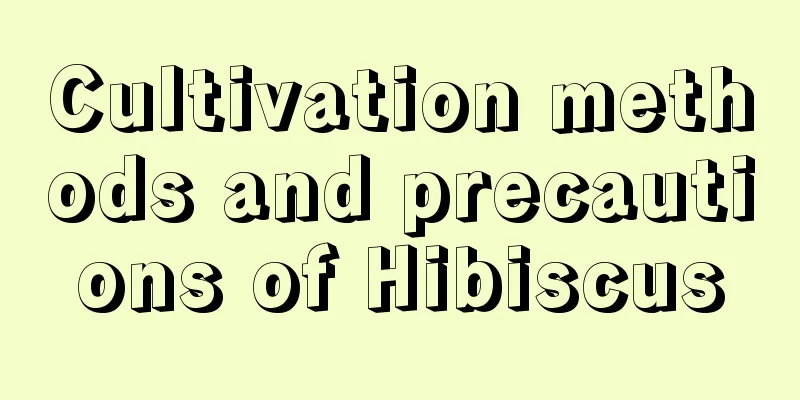Cultivation methods and precautions of Hibiscus

How to grow HibiscusPot soil selectionWhen growing hibiscus, you can choose a larger porcelain pot or a unglazed pot. The soil used should generally be loose, fertile, well-breathable, and slightly moist. Water and fertilizer managementHibiscus requires sufficient water and fertilizer to grow, and the soil needs to be kept moist. In spring, the plant grows vigorously and needs a lot of watering. In summer, when the weather is hot, more watering is also needed. In autumn, watering should be reduced and water control should be carried out appropriately. Watering must be carried out according to the water needs of the plants. Fertilization should be reasonable, and sufficient nutrients can make hibiscus grow better. Fertilizing before flowering, you can apply a little phosphorus fertilizer and a little water to make it bloom better and more beautiful. illuminationHibiscus likes sufficient light, so it is necessary to ensure sufficient light when cultivating it, especially during the flowering period in autumn. If there is insufficient light, it will easily cause buds to fall off. In winter, ensure sufficient light, and in summer when the sun is strong it is best to provide shade. temperatureHibiscus likes a warm growing environment and has a certain degree of cold resistance, but it is best to keep it indoors for the winter and keep the temperature above 10℃ to help it survive the winter better. Precautions for the cultivation of HibiscuspruneHibiscus pruning is usually done after flowering. The tree shape can be trimmed to make it a tree or shrub, and attention should be paid to pruning dead branches and diseased branches so that the crown can be better ventilated and light-permeable. Reproduction methodThere are many ways to propagate Hibiscus, including cutting propagation, layering propagation, and division propagation. Pests and diseasesDuring the cultivation process of hibiscus, there are pests such as aphids, red spiders, cinnabar spider mites, hornworm moths, as well as diseases such as powdery mildew, which need to be prevented and controlled in a timely manner. |
<<: How to grow horse chestnut
>>: How to grow the succulent plant Misty Ice Jade
Recommend
How to behead peach egg
1. Screening During the breeding process, the pla...
How to water the star beauty
1. Daily watering management of Jixingmeiren The ...
What flowers are suitable to plant in the northern yard (good feng shui and good fortune)
What flowers are suitable for planting in the nor...
Cultivation methods and precautions of gorse
1. Maintenance methods 1. Soil: It is best to pre...
How to grow roses to make them flourish
Tips for caring for roses soil When growing roses...
How to plant and care for peonies?
Peony , known as the king of flowers, is famous f...
How to eat Artemisia serrata
The correct way to eat Artemisia selengensis Matu...
Why spend money on flowers! You can grow a beautiful potted plant by picking up a seed from the roadside
Bamboo cypress Where to pick up seeds Bamboo cypr...
How to make fuchsia bloom, and what to do after it blooms
1. How to promote flowering 1. Sunlight: To promo...
How to plant mountain roses in spring
1. Disinfection Matrix Before planting, the subst...
How to deal with the flowers that fall off after repotting Daphne koreana (When is the best time to repot Daphne koreana)
When repotting Daphne odora while it is in bloom,...
If you want beautiful and charming flowers, choose these 6 kinds. Don’t miss them if you love beauty!
orchid Effect: lighten dark circles, repair eye s...
What to do if you overwater your plants
Overwatering plants How to judge whether the plan...
How to care for gardenia in winter
Is Gardenia afraid of cold? The suitable growth t...
How long is the growth cycle of hyacinth?
Introduction to the growth of hyacinth Hyacinth i...









